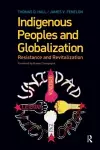
Indigenous Peoples and Globalization
2 authors - Paperback
£49.99
Thomas D. Hall is Professor Emeritus in the Department of Sociology and Anthropology, DePauw University, Greencastle, Indiana. He holds a BA in Anthropology from the University of California at Berkeley, a MA in Anthropology from the University of Michigan, Ann Arbor, and a PhD in Sociology from the University of Washington, Seatke. His interests include indigenous peoples, ethnicity, comparative frontiers, world-systems analysis and globalization, especially as it pertains to all of the preceding interests.
His interests are heavily influenced by his experiences at Navajo Community College, the first Native American tribal college in the U.S., and his observation that one could not understand even local politics in a subdivision of the Navajo Nation without close attention to centuries of history and connects to and effects of interaction with all larger forms of socio-political organization: state, national, and international. He has emphasized the study of those interactions from the local to the global. His attraction to, and interest in, world-systems analysis is found in its guidelines that all social actions must be studied historically and in the sociopolitical contexts.
Among his many publications are: Indigenous Peoples and Globalization: Resistance and Revitalization, with James V. Fenelon (2009, Paradigm); “Lessons from Comparing the Two Southwests: Southwest China and Northwest New Spain / Southwest USA.” Journal of World-Systems Research 19:1(Winter, 2013):24-56; “The Ecology of Herding: Conclusions, Questions, Speculations.” Pp. 267 – 280 in The Ecology of Pastoralism edited by P. Nick Kardulias. 2015. Boulder: University Press of Colorado;“Environment, Power, Development in Global South: Revolutions, Blue & Green.” Nature + Culture 11:2(Summer):215-228. A longer biographical statement is available at A Long Strange Trip: Reminisces of an Academic Career. 2016. Trajectories 47:3(Spring):87-95 (Newsletter of the ASA Comparative and Historical Sociology Section).
In retirement he continues his academic activities. His curriculum vitae and most of his publications are available on Academia.edu.